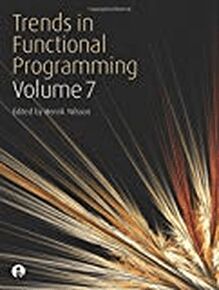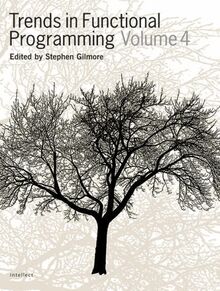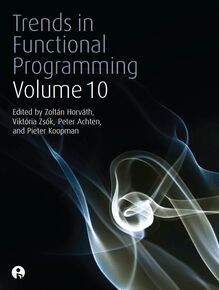-
 Univers
Univers
-
 Ebooks
Ebooks
-
 Livres audio
Livres audio
-
 Presse
Presse
-
 Podcasts
Podcasts
-
 BD
BD
-
 Documents
Documents
-
- Cours
- Révisions
- Ressources pédagogiques
- Sciences de l’éducation
- Manuels scolaires
- Langues
- Travaux de classe
- Annales de BEP
- Etudes supérieures
- Maternelle et primaire
- Fiches de lecture
- Orientation scolaire
- Méthodologie
- Corrigés de devoir
- Annales d’examens et concours
- Annales du bac
- Annales du brevet
- Rapports de stage
La lecture à portée de main
Vous pourrez modifier la taille du texte de cet ouvrage
Découvre YouScribe en t'inscrivant gratuitement
Je m'inscrisDécouvre YouScribe en t'inscrivant gratuitement
Je m'inscrisEn savoir plus
Vous pourrez modifier la taille du texte de cet ouvrage
En savoir plus

Description
Volume 10 in the Trends in Functional Programming (TFP) series presents some of the latest research results in the implementation of functional programming languages and the practice of functional programming. It contains a peer-reviewed selection of the best articles presented at the 2009 Tenth Symposium on Trends in Functional Programming held in Komárno, Slovakia. TFP 2009 was co-located with the Third Central European Functional Programming School (CEFP 2009) and organized by the Department of Programming Languages and Compilers, Faculty of Informatics, Eötvös Loránd University, Budapest and the Selye János University, Komárno.
Sujets
Informations
| Publié par | Intellect Books Ltd |
| Date de parution | 10 mai 2014 |
| Nombre de lectures | 1 |
| EAN13 | 9781841504421 |
| Langue | English |
| Poids de l'ouvrage | 2 Mo |
Informations légales : prix de location à la page 0,2200€. Cette information est donnée uniquement à titre indicatif conformément à la législation en vigueur.
Extrait
Trends in Functional Programming 10
Trends in Functional Programming 10
Edited by Zolt n Horv th, Vikt ria Zs k, Peter Achten, and Pieter Koopman
First published in the UK in 2011 by
Intellect, The Mill, Parnall Road, Fishponds, Bristol, BS16 3JG,
UK
Copyright 2011 Intellect Ltd
All rights reserved. No part of this publication may be reproduced, stored in a retrieval system, or transmitted, in any form or by any means, electronic, mechanical, photocopying, recording, or otherwise, without written permission.
A catalogue record for this book is available from the British Library.
Cover designer: Holly Rose Copy-editor: Danielle Styles
ISBN 978-1-84150-158-1 / EISBN 978-1-84150-442-1
Printed and bound by Gutenberg Press, Malta.
Preface
This volume presents the reviewed and revised selected papers of the Tenth Symposium on Trends in Functional Programming (TFP 2009), held at Selye J nos University, Kom rno, Slovakia on 2-4 June 2009.
TFP was formerly known as the Scottish Functional Programming Workshop and has been organized annually since 1999 in Scotland, Germany, Estonia, England, the United States and the Netherlands. TFP 2009 was co-located with the Third Central European Functional Programming School (CEFP 2009) and organized by the Department of Programming Languages and Compilers, Faculty of Informatics, E tv s Lor nd University, Budapest and the Selye J nos University, Kom rno.
The Symposium on Trends in Functional Programming is an international forum for researchers with interests in all aspects of functional programming languages, including, but not limited to theory, applications, architectures and implementations, parallel programming, and types. TFP is intended to be a venue for the publication of papers both describing new research results and identifying new or long-term trends. In particular, we encourage young researchers to present their work at TFP. In recognition of the extra effort spent in giving polished presentations, the programme committee of TFP gives out a Best Student Paper award each year. This year the programme committee decided to award the paper On Graph Rewriting, Reduction and Evaluation by Ian Zerny.
TFP is designed to be a platform for novel and upcoming research, combined with a post-event refereeing process and a formal publication of selected papers as a book. Researchers from all over Europe, the United States and Canada registered for the Symposium and 24 papers and abstracts have been submitted.
All speakers attending the Symposium were invited to submit a revised paper afterwards. The submitted papers were each carefully checked by readers selected from among the most qualified available and then revised once more by the lecturers. We are very grateful to the anonymous referees, all excellent researchers in functional programming, for the time and effort they devoted to reviewing the papers. Finally, the programme committee decided to select eleven high-quality papers for publication in this volume.
We are grateful for the generous support of the Faculty of Informatics at E tv s Lor nd University, Budapest and for that of Selye J nos University, Kom rno. We would also like to thank the members of the programme and organizing committees for their hard work to make TFP 2009 successful. Special thanks to the local organizing co-chair, Veronika Stoffa.
Budapest, December 2009
Zolt n Horv th, Vikt ria Zs k, Peter Achten, Pieter Koopman Editors
Organization
The Tenth Symposium on Trends in Functional Programming was organized by the Department of Programming Languages and Compilers, Faculty of Informatics, E tv s Lor nd University, Budapest.
Programme chairs
Zolt n Horv th
(E tv s Lor nd University, HU)
Vikt ria Zs k
E tv s Lor nd University, HU)
Symposium chairs
Peter Achten
(Radboud University Nijmegen, NL)
Pieter Koopman
(Radboud University Nijmegen, NL)
Organizing chairs
Zolt n Horv th
(E tv s Lor nd University, HU)
Vikt ria Zs k
(E tv s Lor nd University, HU)
Veronika Stoffa
(Selye J nos University, SK)
Judit Juh sz
(Managing Director, Pannonia Tourist Service)
Organizing committee
Istv n Boz
(E tv s Lor nd University, HU)
Zolt n Cs rnyei
(E tv s Lor nd University, HU)
Gergely D vai
(E tv s Lor nd University, HU)
P ter Divi nszky
(E tv s Lor nd University, HU)
Anik L n rt
(E tv s Lor nd University, HU)
M nika M sz ros
(E tv s Lor nd University, HU)
Gabriella N das
(E tv s Lor nd University, HU)
Adrienn Olajos
(E tv s Lor nd University, HU)
D ra Papp
(E tv s Lor nd University, HU)
Melinda T th
(E tv s Lor nd University, HU)
Programme committee
Peter Achten
(Radboud University Nijmegen, NL)
John Clements
(California Polytechnic State University, USA)
Cormac Flanagan
(University of California at Santa Cruz, USA)
Jurriaan Hage
(Utrecht University, NL)
Kevin Hammond
(University of St. Andrews, UK)
Michael Hanus
(Christian-Albrechts University zu Kiel, DE)
Ralf Hinze
(University of Oxford, UK)
Zolt n Horv th
(E tv s Lor nd University, HU)
Graham Hutton
(University of Nottingham, UK)
Johan Jeuring
(Utrecht University, NL)
Pieter Koopman
(Radboud University Nijmegen, NL)
Hans-Wolfgang Loidl
(Ludwig-Maximilians University of Munich, DE)
Rita Loogen
(Philipps-Universit t Marburg, DE)
Greg Michaelson
(Heriot-Watt University, UK)
Marco T. Moraz n
(Seton Hall University, USA)
Rex L. Page
(University of Oklahoma, USA)
Sven-Bodo Scholz
(University of Hertfordshire, UK)
Clara Segura
(University Complutense of Madrid, ES)
Mary Sheeran
(Chalmers University of Technology, SE)
Phil Trinder
(Heriot-Watt University, UK)
Marko van Eekelen
(Radboud University Nijmegen, NL)
Varmo Vene
(University of Tartu, EE)
Vikt ria Zs k
(E tv s Lor nd University, HU)
Table of Contents
Graph-based Communication in Eden
Thomas Horstmeyer and Rita Loogen (Philipps-Universit t Marburg, Marburg, Germany)
Compiling Concurrency Correctly: Cutting Out the Middle Man
Liyang HU and Graham Hutton (University of Nottingham, UK)
Towards Compiling SaC to CUDA
Jing Guo (University of Hertfordshire, Hatfield, UK), Jeyarajan Thiyagalingam (University of Oxford, Oxford, UK) and Sven-Bodo Scholz (University of Hertfordshire, Hatfield, UK)
Low Pain vs No Pain Multi-core Haskells
Mustafa Aswad, Phil Trinder, Abdallah Al Zain, Greg Michaelson (Heriot-Watt University, Edinburgh, UK) and Jost Berthold (Datalogisk Institut, University of Copenhagen, Denmark)
An Operational Semantics for Distributed Lazy Evaluation
Lidia S nchez-Gil, Mercedes Hidalgo-Herrero and Yolanda Ortega-Mall n (Universidad Complutense de Madrid, Madrid, Spain)
On Graph Rewriting, Reduction and Evaluation
Ian Zerny (Aarhus University, Aarhus, Denmark)
A Reflection-based Proof Tactic for Lattices in Coq
Daniel W. H. James and Ralf Hinze (University of Oxford, Oxford, England)
Generic Programming for Domain Reasoners
Johan Jeuring (Universiteit Utrecht and Open Universiteit, The Netherlands), Jos Pedro Magalh es (Universiteit Utrecht, Utrecht, The Netherlands) and Bastiaan Heeren (Open Universiteit, Heerlen, The Netherlands)
Haskell Module Tools for Liberating Type Class Design
Wolfram Kahl (McMaster University, Hamilton, ON, Canada)
Signals, Not Generators!
Wolfgang Jeltsch (Brandenburgische Technische Universit t Cottbus, Cottbus, Germany)
Braincurry: A Domain- specific Language for Integrative Neuroscience
Tom Nielsen (University of Leicester, UK and University of Nottingham, UK) and Tom Matheson (University of Leicester, UK), Henrik Nilsson (University of Nottingham, UK)
Author Index
Chapter 1
Graph-based Communication in Eden
Thomas Horstmeyer and Rita Loogen 1 Category: Research
Abstract : We present a new approach to the definition and creation of process topologies in the parallel functional Haskell extension Eden. Grace ( Gra ph-based c ommunication in E den) allows a programmer to specify a network of processes as a graph, where the graph nodes represent processes and the edges represent communication channels. This simplifies the specification and creation of complex communication topologies a lot. The main benefit of the new approach is the clean separation between coordination and computation. Runtime experiments show that Grace has a marginal overhead in comparison with traditional Eden code.
1.1 INTRODUCTION
The parallel functional language Eden [ 8 ] enables programmers to define process networks with arbitrary topologies. However, the creation of a non-tree-like topology had up to now to be done on a low level of abstraction, using so-called dynamic channels . These channels are created by receiver processes and must be passed to the corresponding sender processes to establish a direct channel connection between those processes. This is a rather tedious and error-prone task.
In this paper, we present a new approach to the definition and creation of process topologies in Eden. Grace ( Gra ph-based c ommunication in E den) allows a programmer to specify a network of processes as a graph, where the graph nodes represent processes and the edges represent communication channels. The graph is described as a Haskell data structure ProcessNetwork a , where a is the result type of the network computation. A function start will instantiate the network and automatically set up the corresponding process topology, i.e. the processes are created and the necessary communication channels are installed. The main benefit of the new approach is the clean separation between coordination and computation. The network specification encapsulates the coordinational aspects. The graph nodes are annotated with functions describing the computations of the corresponding processes.
FIGURE 1.1. Network Topology for the Sums of Elements in the Pascal s Triangle
Generally, a user defines the process network by placing functions on nodes and connecting the nodes with edges. For every parameter that a function ta
-
 Univers
Univers
-
 Ebooks
Ebooks
-
 Livres audio
Livres audio
-
 Presse
Presse
-
 Podcasts
Podcasts
-
 BD
BD
-
 Documents
Documents
-
Jeunesse
-
Littérature
-
Ressources professionnelles
-
Santé et bien-être
-
Savoirs
-
Education
-
Loisirs et hobbies
-
Art, musique et cinéma
-
Actualité et débat de société
-
Jeunesse
-
Littérature
-
Ressources professionnelles
-
Santé et bien-être
-
Savoirs
-
Education
-
Loisirs et hobbies
-
Art, musique et cinéma
-
Actualité et débat de société
-
Actualités
-
Lifestyle
-
Presse jeunesse
-
Presse professionnelle
-
Pratique
-
Presse sportive
-
Presse internationale
-
Culture & Médias
-
Action et Aventures
-
Science-fiction et Fantasy
-
Société
-
Jeunesse
-
Littérature
-
Ressources professionnelles
-
Santé et bien-être
-
Savoirs
-
Education
-
Loisirs et hobbies
-
Art, musique et cinéma
-
Actualité et débat de société
- Cours
- Révisions
- Ressources pédagogiques
- Sciences de l’éducation
- Manuels scolaires
- Langues
- Travaux de classe
- Annales de BEP
- Etudes supérieures
- Maternelle et primaire
- Fiches de lecture
- Orientation scolaire
- Méthodologie
- Corrigés de devoir
- Annales d’examens et concours
- Annales du bac
- Annales du brevet
- Rapports de stage










